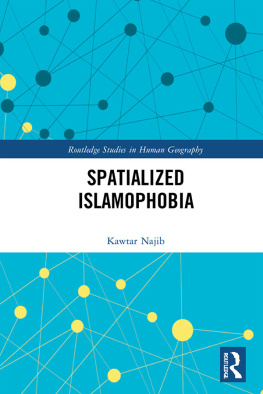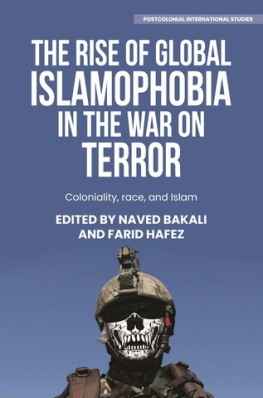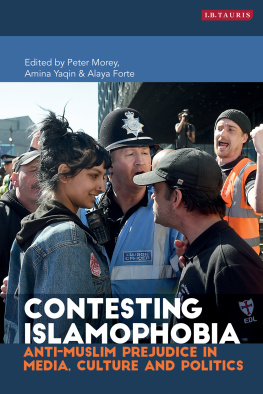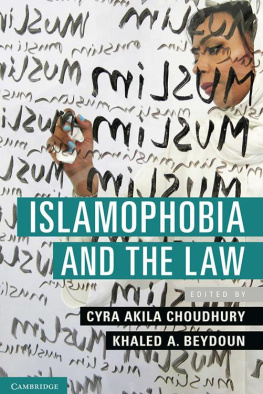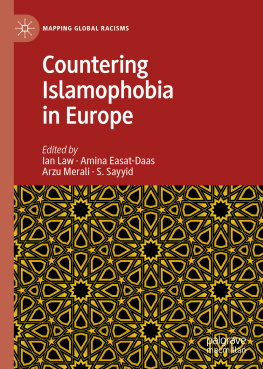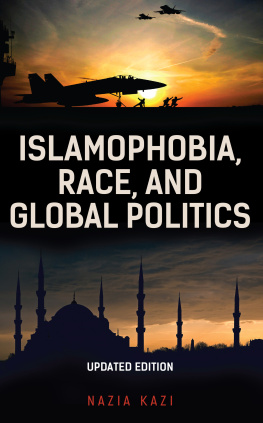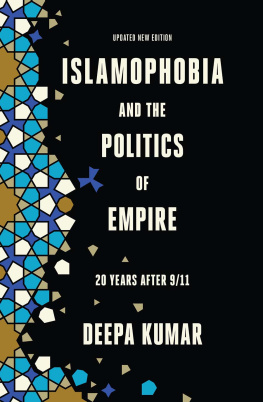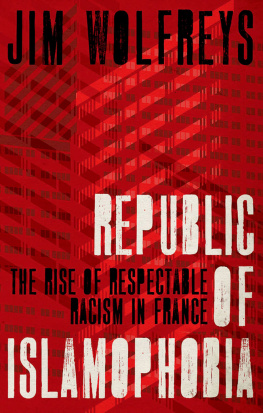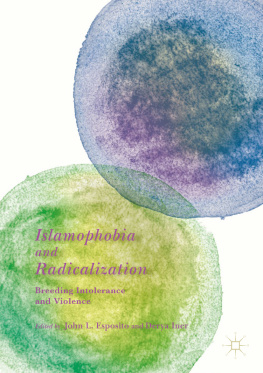Spatialized Islamophobia
This book demonstrates the spatialized and multi-scalar nature of Islamophobia. It provides ground-breaking insights in recognizing the importance of space in the formation of anti-Muslim racism.
Through the exploration of complementary data, both from existing quantitative databases and directly from victims of Islamophobia, applied in two important European capitals Paris and London this book brings new materials to research on Islamophobia and argues that Islamophobia is also a spatialized process that occurs at various interrelated spatial scales: globe, nation, urban, neighbourhood and body (and mind). In so doing, this book establishes and advances the new concept of Spatialized Islamophobia by exploring global, national, urban, infra-urban, embodied and emotional Islamophobias, as well as their complex interrelationships. It also offers a critical discussion of the geographies of Islamophobia by pointing out the lack of geographical approaches to Islamophobia Studies. By using self-reflexivity, the author raises important questions that may have hampered the study of Spatialized Islamophobia, focusing in particular on the favoured methodologies, which too often remain qualitative, as well as on the whiteness of the discipline of Geography, which can disrupt the legitimacy of a certain knowledge.
The book will be an important reference for those in the fields of Human Geography, Sociology, Politics, Racial Studies, Religious Studies and Muslim Studies.
Kawtar Najib is a social and urban geographer with research interests in social inequality and religious discrimination using both quantitative and qualitative methods. She was a Marie Curie Fellow at Newcastle University where she was the principal researcher of the SAMA project (Spaces of Anti-Muslim Acts), funded by the European Commission, which highlights the impact of Islamophobic discrimination on space and people. She earned her PhD in Geography and Planning at the University of Franche-Comt (France) on socio-spatial inequality and residential segregation in urban neighbourhoods. Her research explores more broadly issues of social and spatial justice.
Routledge Studies in Human Geography
This series provides a forum for innovative, vibrant, and critical debate within Human Geography. Titles will reflect the wealth of research which is taking place in this diverse and ever-expanding field. Contributions will be drawn from the main sub-disciplines and from innovative areas of work which have no particular sub-disciplinary allegiances.
Why Guattari? A Liberation of Cartographies, Ecologies and Politics
Edited by Thomas Jellis, Joe Gerlach, and John-David Dewsbury
Object-Oriented Cartography
Maps as Things
Tania Rossetto
Human Geography and Professional Mobility
International Experiences, Critical Reflections, Practical Insights
Weronika A. Kusek and Nicholas Wise
Geographies of the Internet
Edited by Barney Warf
Locating Value
Theory, Application and Critique
Edited by Samantha Saville and Gareth Hoskins
Spatialized Islamophobia
Kawtar Najib
Over Researched Places
Towards a Critical and Reflexive Approach
Edited by Cat Button and Gerald Taylor Aitken
For more information about this series, please visit: www.routledge.com/Routledge-Studies-in-Human-Geography/book-series/SE0514
Spatialized Islamophobia
Kawtar Najib

First published 2022
by Routledge
2 Park Square, Milton Park, Abingdon, Oxon OX14 4RN
and by Routledge
605 Third Avenue, New York, NY 10158
Routledge is an imprint of the Taylor & Francis Group, an informa business
2022 Kawtar Najib
The right of Kawtar Najib to be identified as author of this work has been asserted by her in accordance with sections 77 and 78 of the Copyright, Designs and Patents Act 1988.
All rights reserved. No part of this book may be reprinted or reproduced or utilised in any form or by any electronic, mechanical, or other means, now known or hereafter invented, including photocopying and recording, or in any information storage or retrieval system, without permission in writing from the publishers.
Trademark notice: Product or corporate names may be trademarks or registered trademarks, and are used only for identification and explanation without intent to infringe.
British Library Cataloguing-in-Publication Data
A catalogue record for this book is available from the British Library
Library of Congress Cataloging-in-Publication Data
A catalog record has been requested for this book
ISBN: 978-0-367-89478-8 (hbk)
ISBN: 978-1-032-11118-6 (pbk)
ISBN: 978-1-003-01942-8 (ebk)
DOI: 10.4324/9781003019428
To my parents, and especially my mother
(whose dream it has been that I write a book one day)
And to the people who seek real social justice
(even against their own interests and privileges)
Contents
Figures
Tables
Box
Islamophobia takes varying forms and presents itself in diverse ways in different places. Geography matters: space plays a complex role in relation to Islamophobia. However, Islamophobia is primarily studied in social science disciplines other than Geography; the tendency in research about Islamophobia is to overlook or side-step the ways in which space might matter.
In this important book, Kawtar Najib foregrounds the role of space when studying Islamophobia and sets out how we can move from Critical Islamophobia Studies towards a critical geography of Islamophobia and anti-Muslim racism. Kawtar builds upon the original data that she collected from victims of Islamophobia in London and Paris to set out what a Spatialized Islamophobia looks like. This study was funded through the award of a prestigious individual fellowship to Kawtar from the Marie Sklodowska-Curie Actions of the European Commission and was hosted at Newcastle University in North East England.
This study is innovative not only in the attention it gives to the lived experiences of those who have experienced Islamophobia, but also in how it combines this with the spatial mapping of Islamophobic incidents to explore how they are concentrated or not in specific neighbourhoods. In doing so, this text makes a crucial point about the strength of adopting a combination of quantitative and qualitative methods in promoting a critical understanding of Spatialized Islamophobia.
Kawtar also reflects critically on her position as a racially and ethnically minoritized Muslim woman working on issues of inequality and Islamophobia, while negotiating the colonial, elitist and exclusionary spaces of academia, and in particular French academia. In doing so, she raises important questions about the whiteness of the discipline of Geography and calls for the inclusion of ethnic and religious minorities within the discipline.
Overall, the significant intervention included in the pages of this book establishes the new concept of Spatialized Islamophobia. Specific attention is paid to global, national, urban, infra-urban, embodied and emotional Islamophobias and the complex ways in which these are interconnected and mutually reinforcing. This is a must read for any scholar or student interested in Islamophobia, racism and inequality in the social sciences, as well as scholars and activists interested in challenging whiteness, discrimination and exclusionary practices in the contemporary academy.

